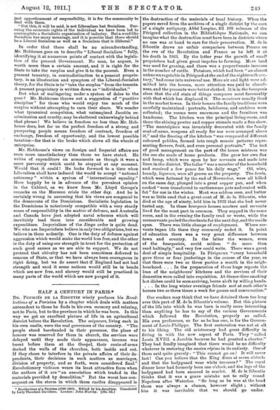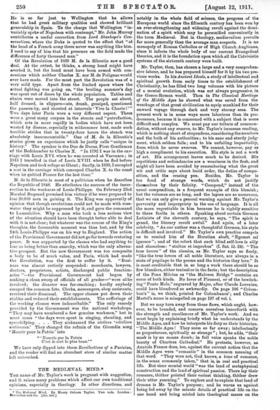HALF A CENTURY IN PARIS.*
Da. POUMAS DE LA SIBOUTTE wisely prefaces his Recol- lections of a Parisian by a chapter which deals with matters antecedent to those he finds in his own memory and relating, not to Paris, but to the province in which he was born. In this way we get an excellent picture of life in an agricultural district before the Revolution. The seigneurs, living each in his own castle, were the real governors of the country. " The people stood bareheaded in their presence, the place of honour was reserved for them in church, the services were delayed until they made their appearance, incense was burnt before them at the Gospel, their coats-of-arms decked the walls of the churches, both inside and out. If they chose to interfere in the private affairs of their de- pendants, their decisions in such matters as marriages, division of property, and so forth, were considered final." Revolutionary violence wears its least attractive form when the authors of it are "an association which traded in the materials provided by demolition." But the worst loss con- sequent on the storm in which these castles disappeared is • Recoltections of a Parisian (1789-1863). Edited by his daughter. Translated by Lady Theodora Davidson. London: John Murray. Ms. 6d.) the destruction of the materials of local history. When the papers saved from the archives of a single district by the care of a single antiquary, Abbe Lespine, fill 160 volumes of the Perigord collection in the Bibliotbbque Nationale, we can imagine what the destruction must have been in districts where no one was at hand to care for their preservation. M. de In Siboutie draws no unfair comparison between France on the eve of the Revolution and France as he left it at his death in 1863. By the latter year the growth of small proprietors bad given great impetus to farming. More land was used for grazing, and there was a proportionate increase in the number of cattle. Potatoes, which had been " an almost unknownvegetable in Perigord at the end of the eighteenth cen- tury," had come into universal use. More air and light were ad- mitted into the houses, more attention was paid to cleanli- ness, and the peasants were better clothed. It is in the bourgeois class that the old state of things compares most favourably with that which has displaced it. The messieurs usually lived in the market towns. In their houses the family traditions were carefully maintained : portraits, heirlooms, and archives were collected ; the rooms were enormous and the furniture was handsome. The kitchen was the principal living-room, and there the shining pewter and copper utensils made a fine show. " The mantelpiece was invariably decorated with the family coat-of-arms, weapons all ready for use were arranged above it," and the flooring of the kitchen "was composed of different coloured pebbles, formed into rough mosaic patterns repre- senting flowers, fruit, and even personal portraits." The test of good management on the part of the house mistress was the use she made of home products. She grew her own flax and hemp, which were spun by her servants and made into linen in the district. The tailor " was a member of the household and received a few pence for his daily wage." Oil, wine, brandy, liqueurs, were all grown on the property. The fowls, which were fattened by the end of November, were all killed on the same day, plunged into a great copper pan, and when cooked "were transferred to earthenware pots and coated with fat" for use in the winter. Meat was seldom seen, and butter was so little used that a great-aunt of M. de la Siboutie, who died at the age of ninety, told him in 1832 that she had never tasted any. In these bourgeois houses masters and servants lived for the most part in common. They supped in the same room, and in the evening the family read or wrote, while the menservants peeled the chestnuts for the next day, and the maids span. There was little change of employment. Where ser- vants began life there they commonly ended it. In point of education there was a very great difference between town and country. In the latter the women, even of the bourgeoisie, could seldom " do more than read haltingly," and very few could write. There was a great deal of simple hospitality. In Perigueux " every household gave three or four junketings in the course of the year, so that there were two or three parties a month in the neigh- bourhood. . . . In the preparation of these huge repasts the loan of the neighbours' kitchens and the services of their domestics were called into requisition. At dinner-time smoking hot dishes could be seen arriving, borne aloft by willing hands. . . . In the long winter evenings friends met at each other's houses two or three times a week for games and conversation."
Our readers may think that we have detained them too long over this part of M. de la Siboutie's volume. But this picture of the life into which he was born is really more interesting than anything he has to say of the various Governments which followed the Revolution, properly so called. His own preference, so far as he has one, is for the Govern- ment of Louis-Philippe. The first restoration was not at all to his liking. The old aristocracy had great difficulty in fitting in with the new aspect of Paris. They " called Louis XVIII. a Jacobin because he bad granted a charter." They had fondly imagined that there would be no difficulty whatever in restoring the ancien regime in its entirety. One of them said quite gravely : " This cannot go on ! It will never last ! Can you believe that the King dines at seven o'clock, and that the bodyguard wear white trousers ? " The royal dinner hour had formerly been one o'clock, and the legs of the bodyguard bad been encased in scarlet. M. de la Siboutie thinks that it was a grave mistake not to rally round Napoleon after Waterloo. " So long as he was at the head there was always a chance, however slight ; without him it was inevitable that we should go under.
He is so far just to Wellington that he allows that be had great military qualities and showed brilliant generalship in Spain. To the charge that Wellington "in- variably spoke of Napoleon with contempt," Mr. John Murray contributes a useful correction from Lord Stanhope's Con- versations, where the Duke is quoted to the effect that "at the head of a French army there never was anything like him. I used to say of him that his presence on the field made the difference of forty thousand men."
Of the Revolution of 1830 M. de la Siboutie saw a good deal. At the outset, he thinks, a strong hand might have averted it, but the hand must have been armed with con- cessions which neither Charles X. nor M. de Polignac would ever have made. For the most part the Revolution was of a very mild type. Apart from the limited space where the actual fighting was going on, "the broiling summer's day was spent out of doors by the whole population. Tables and chairs were moved into the street. The people sat about, half dressed, in slippers—ate, drank, gossiped, questioned the passers-by, and shouted at intervals Vive in Charte !'" Two days later Paris wore a very different aspect. There were a great many corpses in the streets and "putrefaction, which sets in more rapidly in bodies which have not been wasted by disease, especially in midsummer heat, made such terrible strides that in twenty-four hours the stench was absolutely insurmountable." One of M. de la Siboutie's stories gives an experience which he justly calls "unique in history." The speaker is the Duo de Duras, First Gentleman of the Bedchamber to Charles X. "In 1792 I was in the car- riage with Louis XVI. when he was arrested at Varennes ; in 1815 I travelled in that of Louis XVIII when he fled before Napoleon and took refuge at Ghent ; finally, in 1830, I occupied a seat in the carriage which conveyed Charles X. to the coast when be quitted France for the last time."
M. de la Siboutie is most of a politician when be describes the Republic of 1848. He attributes the success of the insur- rection to the weakness of Louis-Philippe. On February 23rd Marshal Bugeaud promised him victory if he were prepared to lose 20,000 men in gaining it. The King was apparently of opinion that though revolutions could not be made with rose- water they might be suppressed by it, and gave the command to Lamoriciere. Why a man who took a less serious view of the situation should have been thought better able to deal with it is not clear; but whatever was the course of the King's thoughts, the favourable moment was thus lost, and by the 24th Louis-Philippe was on his way to England. The action of the Provisional Government did not go far towards restoring peace. It was supported by the classes who had anything to lose as being better than anarchy, which was the only alterna- tive prospect. But the new Government was too composite a body to be of much value, and Paris, which had made the Revolution, was the first to suffer by it. "Busi- ness was almost entirely suspended : merchants, lawyers, doctors, proprietors, artists, discharged public function. aries "—the Provisional Government had begun by making a clean sweep of officials of all grades—" were alike involved; the disaster was far-reaching ; hardly anybody escaped the common fate. Clerks, messengers, shop assistants, received their dismissal. The upper classes put down their stables and reduced their establishments. The sufferings of the working classes were indescribable." The only remedy provided by the Government was the national workshops. "They may have numbered a few genuine workmen," but in most cases " the days were spent in singing, shouting, and speechifying. . . . They nicknamed the ateliers lynchers nationaux.' They changed the refrain of the Girondin song Mourir pour la Patrie ' into " Nourris par Is Patric) C'est le sort le plus beau."
We have only dipped into these Recollections of a Parisian, and the reader will find an abundant store of similar matter left untouched.



































 Previous page
Previous page